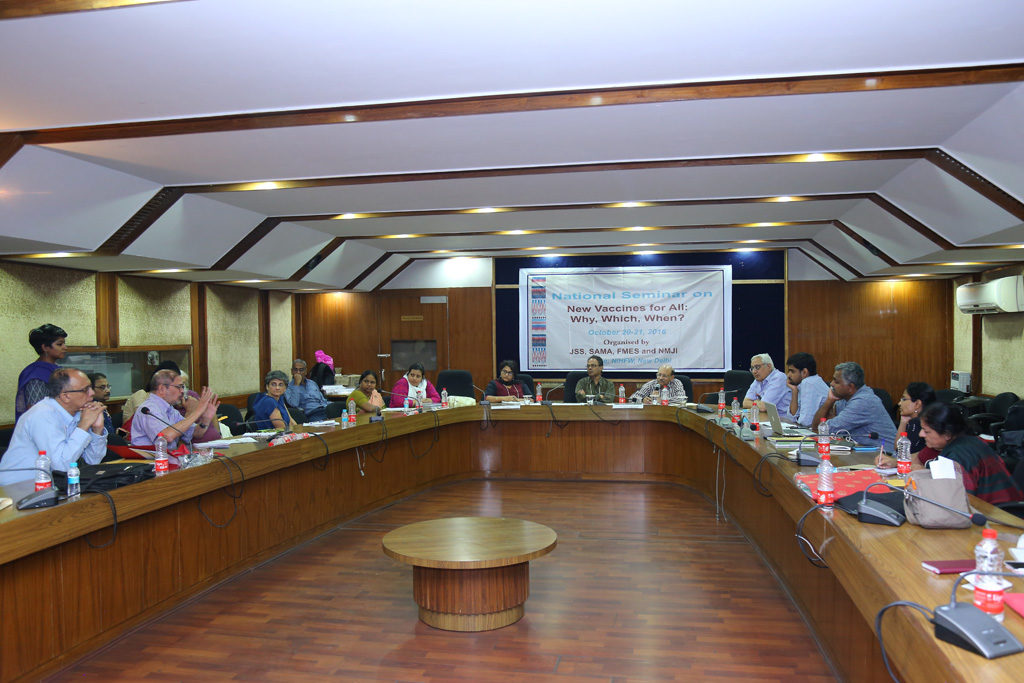
The National Seminar on New Vaccines For All: Why, Which, When? was held on October 20-21, 2016 at the National Documentation Centre Conference Hall, National Institute of Health and Family Welfare (NIHFW), New Delhi.
The seminar was organised by Jan Swasthya Sahyog (JSS), Sama Resource Group for Women and Health, Forum for Medical Ethics Society (FMES) and National Medical Journal of India (NMJI). Dr. Yogesh Jain, Ms. Sarojini N and Dr. Amar Jesani, members of the co-organising committee of the seminar are also members of the Mission Steering Group (MSG) of the National Health Mission (NHM).
A range of issues on new vaccines and combination vaccines had emerged during the MSG meetings and it was felt that such a seminar would be an opportune platform for a robust deliberation on their varied aspects.
Other recent developments with regard to vaccines also prompted the conceptualisation of the seminar. Firstly, hepatitis B vaccine had been included in the Universal Immunisation Programme (UIP) a few years ago, which initially included six vaccines. Secondly, the pentavalent, a combination vaccine is being introduced in a phased manner in the UIP. Thirdly, a slew of new vaccines against rotavirus, rubella, human papilloma virus (HPV), pneumococci and the injectable inactivated polio vaccine were under consideration.
These developments have led to the question – Which new vaccines should be added to the national immunisation programme? Introduction of any new vaccines must be assessed critically for human use in terms of their suitability, safety, protective efficacy and affordability before adopting them into UIP. Moreover, whether the public health system has the organisational capacity to deliver and monitor additional vaccines at an appropriate time, without affecting the coverage of existing vaccines or other health services should be evaluated in accordance with the National Vaccine Policy. Further, in the context of some of the new vaccines, the decision of introduction must also consider other existing public health measures for disease control towards ensuring that the vaccines do not shift focus away from the latter.
The national seminar sought to facilitate a dialogue on ‘New Vaccines’ in the true spirit of public health, and of a high scientific quality towards building perspectives and consensus, where possible, on these issues. It was successful in mobilising participation of representatives from the Ministry of Health and Family Welfare (MOHFW), Indian Council of Medical Research (ICMR), World Health Organisation (WHO), Institute of Economic Growth, public health institutions, civil society organisations, academic institutions, medical colleges hospitals and research institutions, etc.
The key outcomes from the seminar deliberations were expected to contribute to future policy level recommendations. These will also be further discussed at the International Conference on Vaccines to be organised by the Ministry of Health and Family Welfare (MoHFW) in 2017.
The first day of the seminar comprised three sessions. These included a session on the present status of children’s health and vaccination. The second session was on prioritisation of interventions for disease prevention, followed by the session on inclusion of new vaccines in the UIP. The sessions on the second day included deliberations on risk assessment and safety; on cost effectiveness and financial issues; on ethics, laws and regulations; and, on the health system’s preparedness.
Highlights from the Seminar Sessions
Session I: Present Status of Children’s Health and Vaccination
Session II: Prioritisation of Interventions for Disease Prevention
Session III: Inclusion of new vaccine in the UIP: How effective are new vaccines?
Session IV: Inclusion of new vaccine in the UIP: Risk assessment and safety of vaccine
Session V: Ethics and Regulations
Session VI: Inclusion of new vaccine in the UIP: Cost effectiveness and Financial issues
Session VII: Inclusion of New Vaccines in the UIP: Health System Preparedness
Recommendations
Annexures
Annexure 1: Background Note of the Seminar
Annexure 2: Seminar Schedule
Annexure 3: Organisers of the Seminar
Annexure 4: List of Participants




